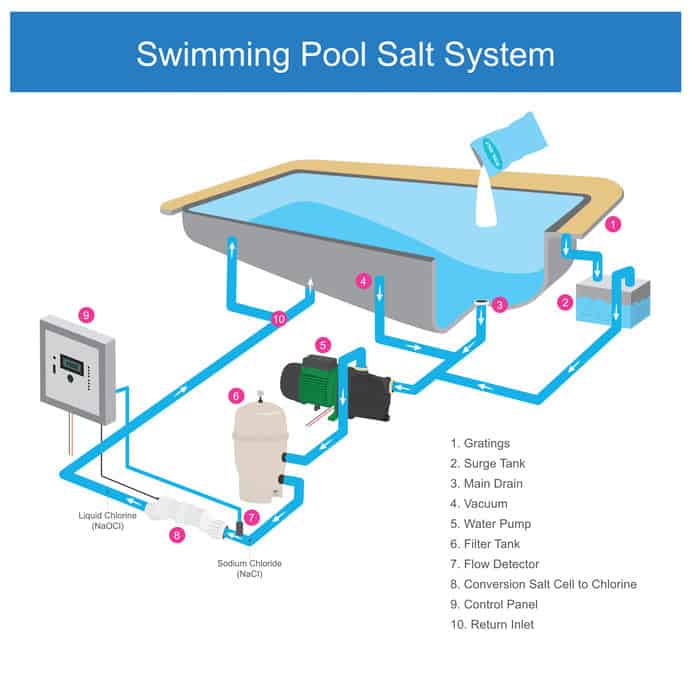A saltwater pool is one that uses a special system called a chlorinator to convert regular NaCl (salt) into chlorine to sanitize the pool water and keep it clean for swimming. Whereas chemical chlorine from liquid or crystal form has a strong smell and can often irritate the eyes, the chlorine produced from the salt isn’t either of those things: There is no smell nor is it hard on the eyes.
But the benefits of a saltwater pool don’t end there nor is that really a full answer to the question what is a saltwater pool because it still does require the use of some chlorine and similar chemicals that other pools do.
Let’s take a deeper look and discover why you might consider a pool with salt water rather than a chlorine or bromine one.

What Is A Saltwater Pool And How Does It Compare?
Saltwater pools
Saltwater pools utilize a chlorinator system, the main part being a plastic chlorinator salt cell, which attaches directly into the pool piping near the pump. The salt cell has titanium plates inside that are electrified so when the water passes through it from the pump, the salt is converted to chlorine through a process called electrolysis. Saltwater pools also require the occasional addition of actual chemical chlorine in liquid or crystal form typically at the beginning of the season to shock the pool, and at times during the season during very hot sun and heavy pool usage to again shock the pool back to proper chemistry.
While the ongoing cost of a saltwater pool tends to be cheaper than a chlorine one, the up front cost is higher since the chlorinator system with cell tends to run $1,200 and up depending on the brand, model, difficulty of wiring, etc.
Chlorine pools
Chlorine pools require the constant (weekly or more frequently) addition of liquid or chlorine directly to the pool water to maintain sanitation. Chlorine tends to be more expensive than bags of salt and also produces side effects including a strong smell left on your skin and clothes, irritation of the eyes and potential drying of the skin with significant exposure.
So while chlorine pools are cheaper to set up since they don’t have an expensive chlorinator system or cell like saltwater pools, the ongoing cost of chlorine is more expensive than salt.
Bromine pools
Bromine pools require the constant addition of bromine to the pool instead of chlorine. Bromine tends to work better in hot water which is why it is often used in spa pools and whirlpools. It also tends not to have as strong a smell as chlorine but has an odor nonetheless. I can’t recall the last time I swam in a personal pool that used bromine but I remember my condo pool used it.
Saltwater pools summary
Modern saltwater pools tend to be more sophisticated than many of their chlorine or bromine-based counterparts since chlorinator systems usually incorporate a number of automation features such as:
- Real time salt level readings, water temperature, pH and others.
- Pump on/off timers.
- Super chlorinator function to increase chlorine production during sunny weather and heavy pool usage.
- Automated salt cell cleaning cycle.
- Ability to manage pool lights, pool heater, water features and other options.
- Automatic monitoring and warnings for low water flow, low/high salt levels, etc.
And in case you were wondering, the salt water levels in a saltwater pool are about 2700-3400 ppm (parts per million). The ocean by way of comparison is about 35,000 ppm. So salt water in a pool is actually quite low comparatively speaking.
Conclusion
- Saltwater pools offer a number of benefits over chlorine pools in terms of no chlorine smell and eye irritation.
- Saltwater pools do tend to have a higher up front cost however due to the purchase of the chlorinator and salt cell.
- Modern chlorinator systems tend to automate a number of things like the pump, chemistry readings and other water features like the heater and lights but still require work when it comes to balancing water chemistry.
- If you’d like a complete explanation of the very top graphic that details the salt chlorination system, do check out my post called How Does A Salt Water Pool Work?
- Check out this Wikipedia entry to learn more about the science behind salt water chlorination.

